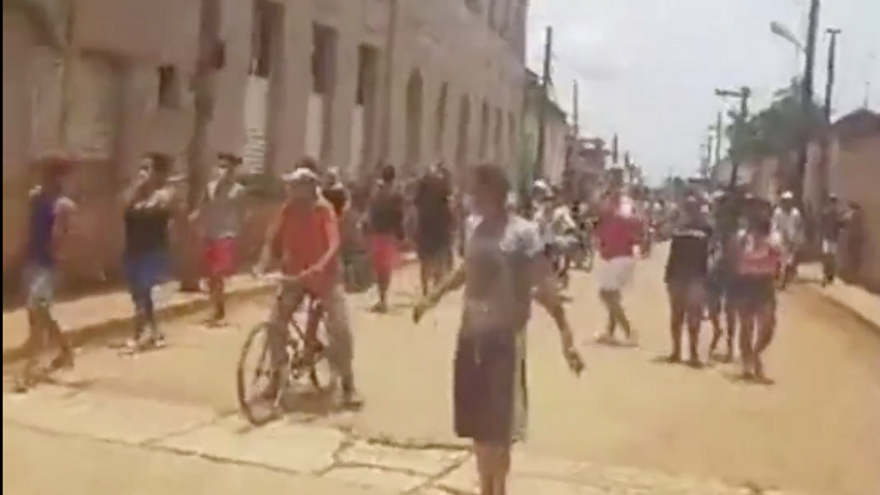
![]() 14ymedio, Havana, July 12, 2021 — The calm this Monday, after the massive protests this Sunday in several Cuban cities, is only on the surface. From the early hours of the day, reports multiply of arrests, repression, and police violence, without many details: the information comes in a trickle because internet service is still cut off on the island.
14ymedio, Havana, July 12, 2021 — The calm this Monday, after the massive protests this Sunday in several Cuban cities, is only on the surface. From the early hours of the day, reports multiply of arrests, repression, and police violence, without many details: the information comes in a trickle because internet service is still cut off on the island.
In Havana, the artists Raúl Prado, Yunior García, Solveig Font, Gretel Medina, Juan Carlos Calahorra, Daniel Triana and Reynier Díaz, who had been arrested in front of the Cuban Institute of Radio and Television, remain in the detention center known as Vivac, near Calabazar. García’s girlfriend, Dayana Prieto Espinosa, reported by telephone to 14ymedio that some, including her partner, were beaten during the arrest. At this time, Prieto, accompanied by Fernando Pérez, is speaking with an officer inside Vivac to get news of those arrested.
They also arrested Luis Manuel Otero Alcántara, leader of the San Isidro Movement, as well as Manuel Cuesta Morúa and Amaury Pacheco, who have been missing since they were taken off a bus in the capital.
From the city of Alquízar, Artemisa, there are reports of police operations and arrests against several of the participants in Sunday’s demonstration. “In my neighborhood they’ve already taken two young people and I’m waiting for them to come looking for me too, because I was one of those who protested,” a young man living in the center of the city explains to this newspaper.
Alquízar was one of the many Cuban municipalities where hundreds of people took to the streets demanding freedom, the end of the dictatorship, and a democratic change on the island. “There were people of all ages, even very old people, who came out with their pots* to protest because in this town there is nothing to eat. We are dying from lack of necessities and medicines.”
Cuban President Miguel Díaz-Canel said Monday, in an appearance with members of his government team, that the protests are aimed at “discrediting the Government and the Revolution” and “fracturing the unity of our people” and insisted that this is another chapter of the “unconventional war” that is being carried out against “all the revolutionary movements,” including Venezuela, and once again holding the United States responsible.
For the president, it is an “overheated media” campaign on social networks that has focused on the shortages to cause social upheaval. The source of dissatisfaction, he said again, is “the blockade.”
In addition, Díaz-Canel reported that “one of the first calls we received yesterday of solidarity, of support, of understanding, was precisely that of brother President Nicolás Maduro of the Bolivarian Republic of Venezuela.”
The president clarified that the appearance this morning is an initiative considered for days “to provide information to the people” about the situation in the country, which is going through the worst moment of the pandemic and a severe economic crisis translated into shortages of food, medicine, and power outages.
Several ministers, including two from the Department of Energy, are appearing with Díaz-Canel on the television program, answering questions from a group of journalists from state media.
Both attributed the blackouts — one of the causes that led to the start of the protests on Sunday — to breakdowns in the island’s main thermoelectric plants, as well as increase in energy demand, and gave assurances that regular service will be restored by this Tuesday.
Thousands of Cubans took to the streets yesterday to protest against the Government, shouting for freedom on a historic day, to which Díaz-Canel reacted by a televised call for people to go out to confront the protesters and defend the Revolution.
When these citizens had left, in the late afternoon, the alternative demonstration of support for the Government went through the streets of Havana shouting “I am Fidel!”, “Cuba yes, Yankees no” and “Down with the blockade.”
The United States “has allocated hundreds of millions of dollars for subversion in our country and imposes a genocidal blockade, principally responsible for economic deficiencies,” Cuban Foreign Minister Bruno Rodríguez wrote on Twitter this Monday.
“The White House National Security Advisor lacks the political and moral authority to speak about Cuba,” he added, referring to Washington’s request that the rights and integrity of the protesters be respected.
*Translator’s note: Banging on pots and pans is a common form of protest in many countries, including Cuba.
Translated by Tomás A.
____________
COLLABORATE WITH OUR WORK: The 14ymedio team is committed to practicing serious journalism that reflects Cuba’s reality in all its depth. Thank you for joining us on this long journey. We invite you to continue supporting us by becoming a member of 14ymedio now. Together we can continue transforming journalism in Cuba.
